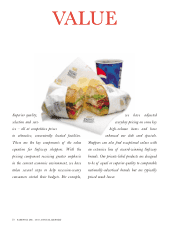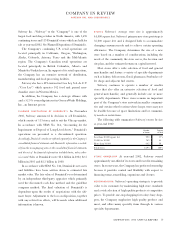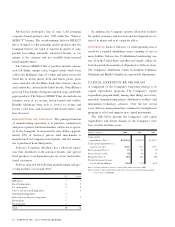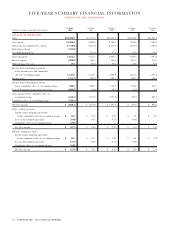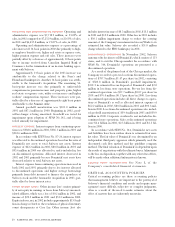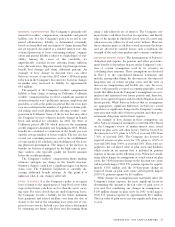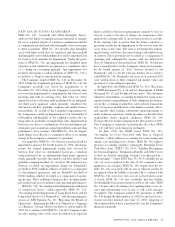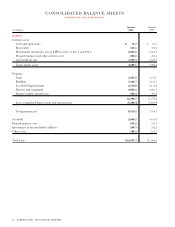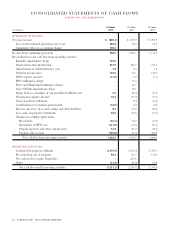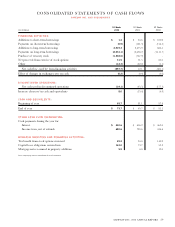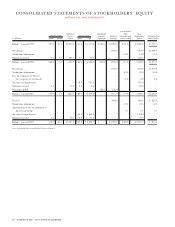Safeway 2002 Annual Report Download - page 22
Download and view the complete annual report
Please find page 22 of the 2002 Safeway annual report below. You can navigate through the pages in the report by either clicking on the pages listed below, or by using the keyword search tool below to find specific information within the annual report.
20 SAFEWAY INC. 2002 ANNUAL REPORT
OPERATING AND ADMINISTRATIVE EXPENSE Operating and
administrative expense was $7,718.9 million, or 23.82% of
sales, in 2002 compared to $7,212.9 million, or 22.68% of sales,
in 2001 and $6,437.8 million, or 21.87% of sales, in 2000.
Operating and administrative expense as a percentage of
sales increased 114 basis points in 2002 due primarily to high-
er employee benefit costs, higher real estate occupancy costs,
higher pension expense and soft sales. These increases were
partially offset by a decrease of approximately 10 basis points
due to income received from Canadian Imperial Bank of
Commerce for the termination of an in-store banking agree-
ment with Safeway.
Approximately 13 basis points of the 2001 increase was
attributable to the charge related to the Furr’s and
Homeland bankruptcies. Another 14 basis points was attrib-
utable to the Genuardi’s Acquisition. The remaining 54-
basis-point increase was due primarily to unfavorable
comparisons in pension income and property gains, higher
real estate occupancy costs, utility cost increases and higher
workers’ compensation expense. These increases were par-
tially offset by a decrease of approximately eight basis points
attributable to the Summit strike.
Annual goodwill amortization was $101.0 million in
2001 and $87.2 million in 2000. Beginning in 2002, good-
will no longer is being amortized. Goodwill was tested for
impairment upon adoption of SFAS No.142, and is being
tested annually for impairment.
INTEREST EXPENSE Interest expense from continuing opera-
tions was $368.6 million in 2002, $366.1 million in 2001 and
$363.6 million in 2000.
In accordance with EITF Issue No. 87-24, interest expense
was allocated to discontinued operations based on the ratio of
Dominick’s net assets to total Safeway net assets. Interest
expense of $62.2 million in 2002, $80.8 million in 2001 and
$93.6 million in 2000 was allocated to, and is included in, loss
on discontinued operations. Allocated interest decreased in
2002 and 2001 primarily because Dominick’s net assets have
decreased relative to total Safeway net assets.
Interest expense from continuing operations increased in
both 2002 and 2001 primarily due to less interest allocated
to discontinued operations and higher average borrowings
primarily from debt incurred to finance the repurchase of
Safeway stock and the Genuardi’s Acquisition in 2001, par-
tially offset by lower interest rates.
OTHER INCOME (LOSS) Other income (loss) consists primari-
ly of net equity in earnings or losses from Safeway’s unconsol-
idated affiliates, which was a loss of $0.2 million in 2002, and
income of $20.2 million in 2001 and $31.2 million in 2000.
Equity in losses, net, in 2002 includes approximately $15.8 mil-
lion in charges related to the resolution of physical inventory
count discrepancies at Casa Ley. Other income (loss) also
includes interest income of $8.5 million in 2002, $13.5 million
in 2001 and $12.0 million in 2000. Other loss in 2001 includes
a $30.1 million impairment charge to reduce the carrying
amount of the Company’s investment in GroceryWorks to its
estimated fair value. Safeway also recorded a $51.0 million
charge related to the FBO bankruptcy in 2001.
DISCONTINUED OPERATIONS In November 2002, Safeway
announced its decision to sell Dominick’s, which consists of 113
stores, and to exit the Chicago market. In accordance with
SFAS No. 144, Dominick’s operations are presented as a
discontinued operation.
As a result of the planned exit of the Chicago market, the
Company recorded a pre-tax loss from discontinued opera-
tions of $787.9 million ($1.47 per share) in 2002, consisting
of $583.8 million in Dominick’s goodwill impairment,
$201.3 in estimated loss on disposal of Dominick’s and $2.8
million in loss from store operations. Pre-tax loss from dis-
continued operations was $27.7 million ($0.07 per share) in
2001 and $76.4 million ($0.13 per share) in 2000. Loss from
discontinued operations includes all direct charges to opera-
tions at Dominick’s as well as allocated interest expense of
$62.2 million in 2002, $80.8 million in 2001 and $93.6 mil-
lion in 2000. Loss from discontinued operations also includ-
ed goodwill amortization of $39.4 million in 2001 and $39.0
million in 2000. Corporate overhead is not included in dis-
continued store operations. Sales at discontinued operations
were $2.4 billion in 2002, $2.5 billion in 2001 and $2.5 bil-
lion in 2000.
In accordance with SFAS No. 144, Dominick’s net assets
and liabilities have been written down to estimated fair mar-
ket value. The fair value of Dominick’s was determined by an
independent third party appraiser which primarily used the
discounted cash flow method and the guideline company
method. The final valuation of Dominick’s is dependent upon
the results of negotiations with the ultimate buyer. Adjustment
to the loss on disposition, together with any related tax effects,
will be made when additional information is known.
RELATED PARTY TRANSACTIONS See Note L of the
Company’s consolidated financial statements.
CRITICAL ACCOUNTING POLICIES
Critical accounting policies are those accounting policies
that management believes are important to the portrayal of
Safeway’s financial condition and results and require man-
agement’s most difficult, subjective or complex judgments,
often as a result of the need to make estimates about the
effect of matters that are inherently uncertain.


